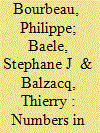|
|
|
Sort Order |
|
|
|
Items / Page
|
|
|
|
|
|
|
| Srl | Item |
| 1 |
ID:
157741


|
|
|
|
|
| Summary/Abstract |
The use of numbers has been remarkably effective at pressing global claims. While research has documented the historical processes through which numbers gained such prominence, and has examined the political and ethical consequences of this omnipresence, very little is known regarding the specific ways in which numbers create the outcomes that sustain governance. This article proposes to close that gap. Building on the literature that acknowledges that numbers not only describe things but also have profound impacts on things themselves, this article offers an integrated account of the working dynamics of numbers in the governance of security. To do so, the article identifies three distinct but connected vectors of power through which numbers shape security governance: persuasion, (de)politicisation, and standardisation. These insights are exemplified through the prism of different empirical examples, the variety of which aims to display the advantages of the approach we propose.
|
|
|
|
|
|
|
|
|
|
|
|
|
|
|
|
| 2 |
ID:
174717


|
|
|
|
|
| Summary/Abstract |
Approximately 8,000 boys and men were killed in the 1995 Srebrenica genocide. The victims were disappeared, killed and buried in secret mass graves. In this article, I examine how forensic anthropologists, demographers and forensic geneticists produced technolegal knowledge about the number of victims in the wake of the genocide; how those numbers were validated in legal proceedings against those held responsible; and, finally, how some have tried to destabilize the numbers in attempts to deny that a genocide was committed. While numbers, and the larger category of knowledge, take centre stage in the discussion, I use Srebrenica’s aftermath to introduce the concept of ontologically dirty knots, which is an analytical and methodological innovation that enables us to produce scholarly accounts of events, such as the Srebrenica genocide, that are characterized partly by secrecy, partly by controversy and partly by materiality. It ties together meaning and materiality, signals a process that continues to evolve, and suggests that narratives about what happened are the results of entanglements, action and friction that can be undone. In these respects, the article addresses current discussions on actor-network theory within critical security studies.
|
|
|
|
|
|
|
|
|
|
|
|
|
|
|
|
| 3 |
ID:
142771


|
|
|
|
|
| Summary/Abstract |
The Vietnam War, and its denouement, the fall of Saigon, was many things, but one, I will contend, was war by numbers. The American military in Vietnam based their strategies and campaigns in part on the collection and analysis of massive amounts of quantitative data. It was a war of big data before that term was coined. Necessarily, substantial use was made of that then recently invented machine par excellence of big data numerical calculation, the computer. IBM’s “Big Blue went to war” too.1 Paul Edwards2 maintains that the Vietnam War was the first to be fought on an “electronic battleground”. Von Clausewitz’s “fog of war” would lift, and the American military would see everything with perfect clarity from within their electronic “information panopticon”.3 How could America lose? But it did. In the end the numbers never added up.
|
|
|
|
|
|
|
|
|
|
|
|
|
|
|
|
|
|
|
|
|